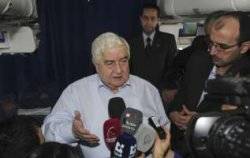Rival sides in the Syrian war have blamed each other for the collapse of peace talks in Geneva, which ended without progress and no agreement to reconvene.
The Syrian foreign minister, Walid al-Muallem, said on Sunday that the US, which backs the Syrian opposition, had tried to "create a very negative climate for dialogue in Geneva".
John Kerry, the US secretary of state, in turn placed blame on the regime of Bashar al-Assad, saying: "We should all agree that the Assad regime’s obstruction has made progress even tougher.
He said the regime "obstructed and filibustered" while the opposition put forward a viable plan to install a transitional government in Damascus.
A transitional government is the key point of the so-called "Geneva I communique" which had been put forward at previous talks in Geneva.
The Syrian regime has not agreed to recognize the communique, however, and is opposed to any plan that would remove Assad from the presidency. The opposition, lead by the Syrian National Coalition, demands that Assad step down.
Kerry and Muallem's comments came after Britain's foreign secretary, William Hague, said on Saturday that "the responsibility lies squarely with the Assad regime", and that the situation was "a serious setback in the search for peace in Syria".
His French counterpart, Laurent Fabiusm also blamed the failure of the talks squarely on Damascus.
The regime "blocked any progress on establishing a transitional government and stepped up violence and acts of terror against the civilian population," Fabius said.
Lakhdar Brahimi, the UN-Arab mediator who chaired the talks, apologized to the Syrian people as both sides left Geneva without agreeing on a plan for further talks.
"I think that what has been, the little that has been achieved in Homs, gave them even more hope that maybe this is the beginning of the coming out of this horrible crisis they are in. I apologise to them that on these two rounds we have not helped them very much," Brahimi said.
Al Jazeera's Stephanie Dekker reporting from Arsal refugee camp in Lebanon said there is palpable anger and frustration amongst an increasingly desperate people.
"A man at the camp asked why are they even speaking when people are dying? They should take the tanks off the streets, lay down their guns, and then move to a political solution.
"People are being treated like animals, they think no one cares, they think it is all about money," added Al Jazeera's reporter.
'Delay tactics'
Bashar Jaafari, Syria's ambassador to the UN, told reporters on Sunday: "We spent six days talking about the necessity to adopt a draft agenda, at the end today the international mediator came to the meeting with a draft agenda, we immediately accepted the draft agenda while the other side did not.
"Whatever you hear from these amateurs when they come here and they stand on the podium and they address the media, the international media, this is not true, they are just misleading the public opinion by circulating some kind of wrong rumors," Jaafari added.
Louay Safi, the Syrian National Coalition (SNC) spokesman told the Associated Press news agency that the session was about finalizing the agenda for the next round, but when they sat down the regime only really wanted to focus on the issue of 'terrorism', the term used by the regime for opposition attacks.
"We want to progress on the two sides. We would like to be assured that the regime really wants a political solution, not a delay tactic," Safi added.
PHOTO CAPTION
Syria regime's Foreign Minister Walid Muallem speaks during a press briefing on peace talks at UN headquarters, on January 31, 2014 in Geneva.
Al-Jazeera


 Home
Home Discover Islam
Discover Islam Quran Recitations
Quran Recitations Lectures
Lectures
 Fatwa
Fatwa Articles
Articles Fiqh
Fiqh E-Books
E-Books Boys & Girls
Boys & Girls  Women
Women










